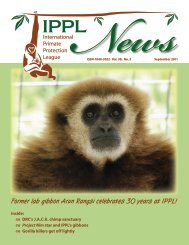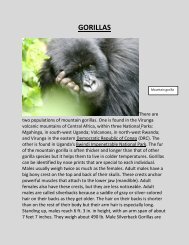Sammy - International Primate Protection League
Sammy - International Primate Protection League
Sammy - International Primate Protection League
Create successful ePaper yourself
Turn your PDF publications into a flip-book with our unique Google optimized e-Paper software.
ORANGUTAN IN SAUDI PET SHOP<br />
The Exotique Pets store in Riyadh, Saudi Arabia, where you can buy an orangutan for US$10,000.<br />
How a young orangutan reached a pet<br />
shop in Saudi Arabia, where he is on sale<br />
at a high price, is a question IPPL has<br />
been trying to answer since first hearing<br />
of the case.<br />
On 28 January 2005, IPPL was tipped<br />
off about the presence of a baby orangutan<br />
in a pet shop in Riyadh, Saudi Arabia. The<br />
infant was a male, around two years old.<br />
The salesperson said that he had sold the<br />
male orangutan’s “sister” for US$10,000<br />
and that he hoped to sell the animal for<br />
55,000 Saudi riyals (about US$13,000).<br />
The orangutan was being kept in a<br />
cage around five by eight feet in size<br />
with a glass window. Store visitors were<br />
able to handle him. The observer asked<br />
IPPL what could be done to rescue the<br />
baby. Clearly, buying him would only<br />
encourage the pet shop owner to obtain<br />
a replacement animal.<br />
IPPL learned that the name of the<br />
pet shop is “Exotique Pets” and that the<br />
shop’s mailing address is a post office box<br />
in Riyadh. Although many businesses in<br />
Saudi Arabia do not have street addresses,<br />
IPPL was informed that the pet shop is<br />
located on 30th Street, near the corner<br />
of Olaya Street, close to the department<br />
store called Gazaz.<br />
Besides the orangutan, the shop was<br />
selling other endangered wildlife such as<br />
macaws and black cockatoos, as well as<br />
various monkey species.<br />
Receiving a report of a wildlife crime<br />
in progress is rare. It presents a wonderful<br />
opportunity for animals to be confiscated,<br />
importers to be investigated, and, if a<br />
crime has taken place, for prosecution<br />
to take place.<br />
IPPL quickly contacted the Saudi<br />
Arabian embassy in the United States,<br />
two officials of the Convention on<br />
<strong>International</strong> Trade in Endangered<br />
Species (CITES), and several Saudi<br />
Arabian government officials.<br />
The Director of the CITES Management<br />
Authority (MA) for Saudi Arabia bears<br />
the ultimate responsibility for enforcing<br />
international wildlife trade laws in that<br />
country. In our message to the Saudi MA,<br />
we pointed out that commercial trade in<br />
endangered species such as orangutans<br />
is specifically banned under CITES and<br />
requested that he investigate this case.<br />
So far we have received no response<br />
from any of the people we contacted. A<br />
primate-friendly member of an Asian<br />
government has passed the information<br />
on to the CITES Standing Committee<br />
and to Interpol, the international police<br />
agency, which has a unit that investigates<br />
wildlife crime.<br />
Stop the Saudi Arabian Orangutan Trade<br />
Protest Letters Needed<br />
Please send letters to the following officials to protest the sale of endangered primates, particularly orangutans,<br />
in Saudi Arabia. Point out that the sale of such animals is in violation of international law, particularly the<br />
CITES treaty. State the location of the pet shop, as given above, and request that the case be investigated; ask<br />
that action be taken against the pet store owners to prevent further illegal animal trade. You may also want to<br />
continued on next page<br />
——————————————————————— IPPL NEWS<br />
www.ippl.org ————————————————— April 2005<br />
3










